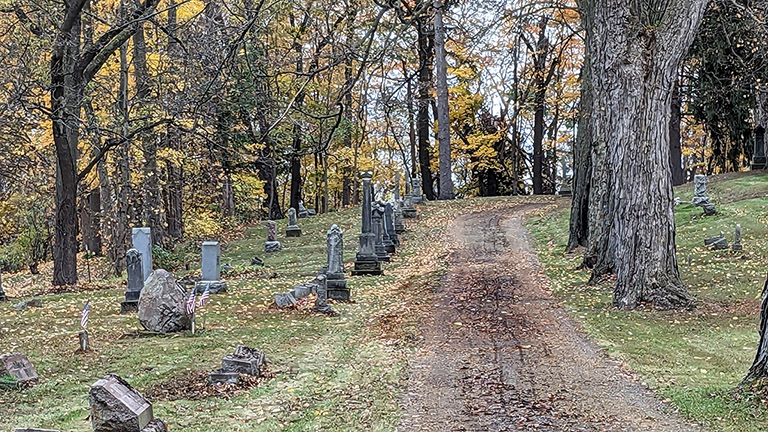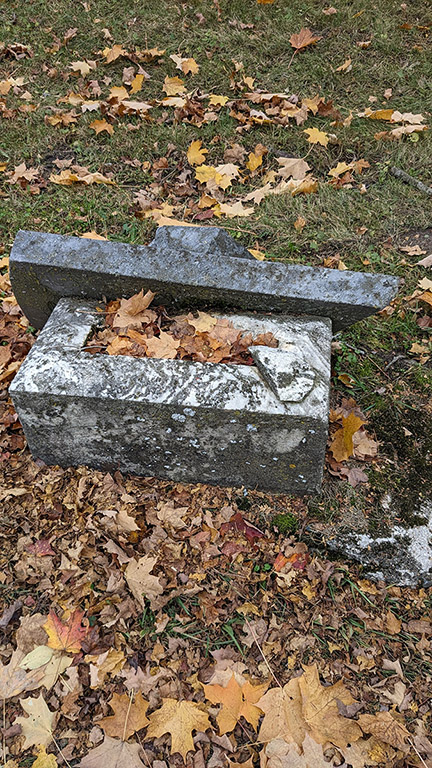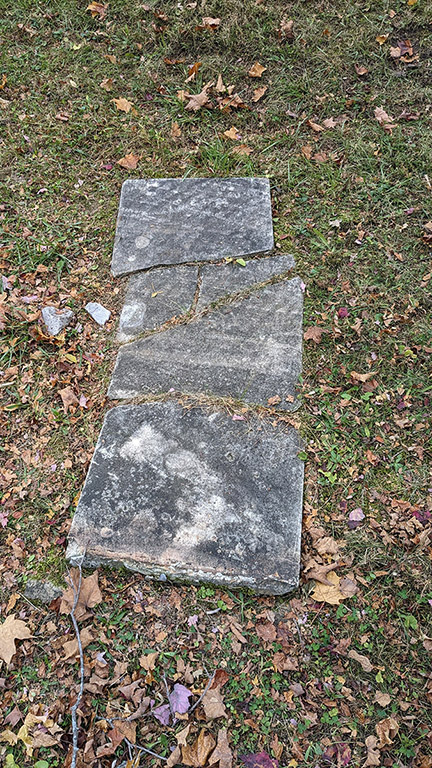

Lauren Mulford, an MA student in Theological Studies, is the KLC Postgraduate Studies Administrator. She lives in Michigan with her husband and eight children. Photographs by the author.



George Bignell was the first pastor of an Episcopal Methodist Church in what was originally called Washington Center, just west of Lansing, the capital of Michigan. He had two sons and a daughter. He preached well, saw many converts and served his community tirelessly, even performing a marriage ceremony one month before his death. He died of the flu – aged 35.
Bignell is buried quite close to my house in a neglected and vandalized grave. This town doesn’t remember him. It’s been 165 years since his death. No one visits his grave; no one knows his name. His own church has forgotten him. His name and his legacy are completely gone, lost to the void of time that takes us all eventually.
So many Christians get caught up in leaving a legacy. We think we have to craft our identity, especially in the social media age. We try to find our eternal life here on earth instead of in the kingdom of heaven. Even as Christians, we might fool ourselves as we pursue immortality by what we write or speak.
Will our legacies let others know what we valued? Is our legacy the only lasting inheritance we can leave our children? Or maybe our children are our legacy. What kind of legacy will you leave? Will God be pleased with it?
We should write papers and books or speak at conferences and churches. However, we shouldn’t invest our hope and desire in crafting an image that others will see momentarily before it fades into oblivion. Instead, we should put our hope in the only thing that will last beyond the grave. The desire to live forever is innate to all humans; yet that desire to craft a legacy is an attempt to grasp eternal life without grasping Christ.
Crafting an earthly legacy (even when we claim it’s for God or godliness) is only of earthly value and will die before us, with us or shortly after us. Those who write history will conform our stories to what benefits their narrative. It’s a vain pursuit (Eccl 1:11).
We forget that where our treasure is, there our hearts will be also (Luke 12:34). As long as we put our treasure into an earthly eternal life, we will be forsaking a heavenly eternal life. Remember the call to live a quiet life (1 Thess 4:11), to be slaves to all (Mark 10:44), especially the lowest of the low (Matt 25:40): we must decrease, Jesus must increase (John 3:30). No one remembers the slave. We need to remember the name of the Lord our God. Our legacy is his name, not ours (Ps 119:55; Prov 18:10).
I think Reverend Bignell isn’t sad that no one remembers him. I think he’s happy that people remember Christ. There are many people history remembers who have no place in the kingdom of heaven.
The high calling of the Christian life is not to any specific profession, but to humbly be forgotten while serving the least of the brothers and sisters of God (Matt 25:40). It takes faith to accept that eternal life in Christ is superior to eternal life on earth (Ps 118:8). I hope I can eventually learn this lesson and have that faith too. I must not craft a legacy of me, but instead take refuge in the promises of God (Eccl 12:13–14).
The Kirby Laing Centre for Public Theology in Cambridge. Charity registered in England and Wales. Charity Number: 1191741
Kirby Laing Centre, Office 1, Unit 6, The New Mill House, Chesterton Mill, French’s Road, Cambridge, CB4 3NP
© 2025 The Kirby Laing Centre for Public Theology in Cambridge